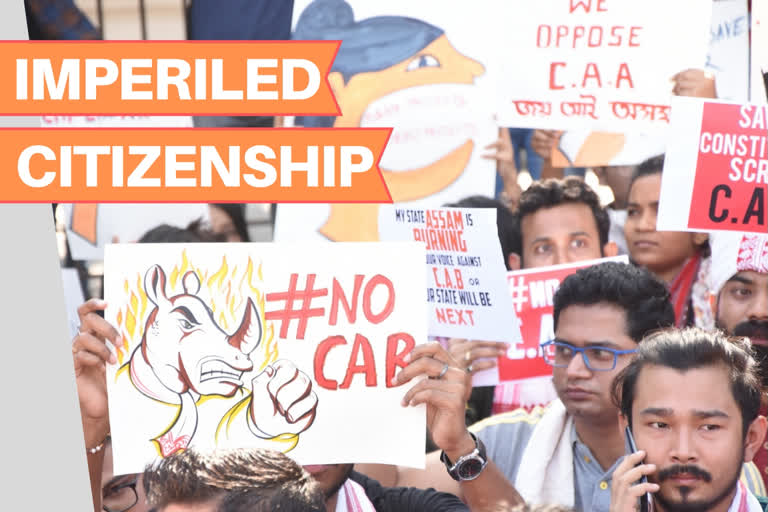New Delhi:As the modern state asserts its monopoly, acquiring and sustaining citizenship has been a critical issue. A contribution of Western civilization understood around conventional imaginations within a fixed territorial framework, issues around citizenship have been major sources of conflicts. The Indian state has been grappling with the issues around citizenship for a long time, more critically now with the enactment of much-contested Citizenship Amendment Bill (CAB).
The CAB, introduced in Lok Sabha on July 19, 2016, was once again tabled on the floor of the parliament and was enacted on December 12, 2019. The Citizenship (Amendment) Act (CAA) of 2019, an act further to amend the Citizenship Act, 1955 inserts the following provision to the principal Act, namely: 'provided that any person belonging to Hindu, Sikh, Buddhist, Jain, Parsi or Christian Community from Afghanistan, Bangladesh or Pakistan, who entered into India on or before the 31st day of December 2014 and who has been exempted by the Central Government by or under clause (c) of sub-section (2) of section 3 of the Passport (Entry into India) Act, 1920 or from the application of the provisions of the Foreigners Act, 1946 or any rule or order made thereunder, shall not be treated as illegal migrant for the purposes of this Act'.
Read: Excessive force used against civilians in Assam: Amnesty India
The enactment of the CAA is witnessing massive protests across the country opposing the Act. The nature of protest can be put into two major categories. Protests that we witness erupting from the premier universities like Jamia Millia Islamia, Aligarh Muslim University and others, and opposition in the Northeastern states, especially in Assam. Pegged with distorted emotions of Hindutva-phobia on one side and Islam-phobia on the other sealed with petty electoral interests, the first category of protests seriously lacks merit and legitimacy. While these protests, guided by competing but vicious political narratives, offer little to critically engage with, the opposition to the CAA in the Northeastern states, especially in Assam, demands thorough scrutiny. The protests are fundamentally different as the first ones demand more inclusive and 'secular' citizenship policy with no discrimination against Muslims; the protest in Assam necessarily demands for 'detecting, deleting and deporting' illegal migrants irrespective of their religious and ethnic identities.
Read: Negligible number of people to benefit from amended Citizenship Act: Sonowal
The opposition to the CAA in Assam is a solid blend of fear and anxiety among the local communities on one side and the 'politics of antagonism' by the political parties on the other. As the state has gone through multiple episodes of protests in the past, violent and otherwise, the on-going events highlight the apathy and indifference of the political parties to one of the most genuine grievances that they have. Moreover, while the protests in the universities are hitting hardlines; the discontent among the Assamese doesn't get the attention it deserves. Insensitivities and large-scale ignorance on the Northeastern states are only to be blamed to this extent. While the gravity of the Assamese resistance to the CAA needs to be critically engaged with; it is vital to highlight the petty electoral interests across the party lines that has kept the issue alive till date. The devil, of course, lies in the historical details
Unearthing History
